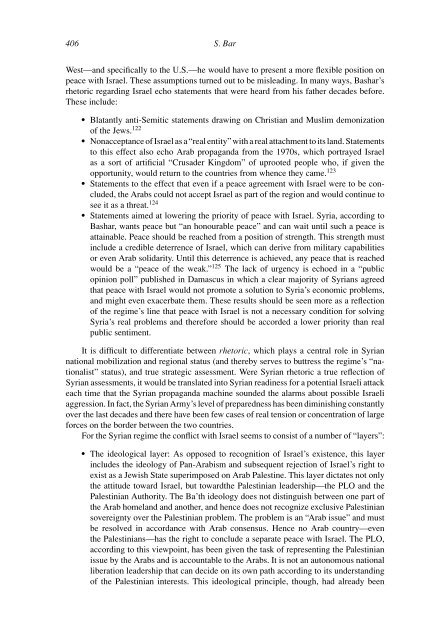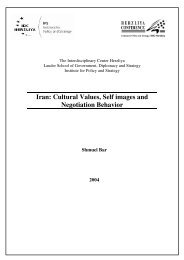Bashar's Syria: The Regime and its Strategic Worldview Shmuel Bar ...
Bashar's Syria: The Regime and its Strategic Worldview Shmuel Bar ...
Bashar's Syria: The Regime and its Strategic Worldview Shmuel Bar ...
You also want an ePaper? Increase the reach of your titles
YUMPU automatically turns print PDFs into web optimized ePapers that Google loves.
406 S. <strong>Bar</strong>West—<strong>and</strong> specifically to the U.S.—he would have to present a more flexible position onpeace with Israel. <strong>The</strong>se assumptions turned out to be misleading. In many ways, Bashar’srhetoric regarding Israel echo statements that were heard from his father decades before.<strong>The</strong>se include: Blatantly anti-Semitic statements drawing on Christian <strong>and</strong> Muslim demonizationof the Jews. 122 Nonacceptance of Israel as a “real entity” with a real attachment to <strong>its</strong> l<strong>and</strong>. Statementsto this effect also echo Arab propag<strong>and</strong>a from the 1970s, which portrayed Israelas a sort of artificial “Crusader Kingdom” of uprooted people who, if given theopportunity, would return to the countries from whence they came. 123 Statements to the effect that even if a peace agreement with Israel were to be concluded,the Arabs could not accept Israel as part of the region <strong>and</strong> would continue tosee it as a threat. 124 Statements aimed at lowering the priority of peace with Israel. <strong>Syria</strong>, according toBashar, wants peace but “an honourable peace” <strong>and</strong> can wait until such a peace isattainable. Peace should be reached from a position of strength. This strength mustinclude a credible deterrence of Israel, which can derive from military capabilitiesor even Arab solidarity. Until this deterrence is achieved, any peace that is reachedwould be a “peace of the weak.” 125 <strong>The</strong> lack of urgency is echoed in a “publicopinion poll” published in Damascus in which a clear majority of <strong>Syria</strong>ns agreedthat peace with Israel would not promote a solution to <strong>Syria</strong>’s economic problems,<strong>and</strong> might even exacerbate them. <strong>The</strong>se results should be seen more as a reflectionof the regime’s line that peace with Israel is not a necessary condition for solving<strong>Syria</strong>’s real problems <strong>and</strong> therefore should be accorded a lower priority than realpublic sentiment.It is difficult to differentiate between rhetoric, which plays a central role in <strong>Syria</strong>nnational mobilization <strong>and</strong> regional status (<strong>and</strong> thereby serves to buttress the regime’s “nationalist”status), <strong>and</strong> true strategic assessment. Were <strong>Syria</strong>n rhetoric a true reflection of<strong>Syria</strong>n assessments, it would be translated into <strong>Syria</strong>n readiness for a potential Israeli attackeach time that the <strong>Syria</strong>n propag<strong>and</strong>a machine sounded the alarms about possible Israeliaggression. In fact, the <strong>Syria</strong>n Army’s level of preparedness has been diminishing constantlyover the last decades <strong>and</strong> there have been few cases of real tension or concentration of largeforces on the border between the two countries.For the <strong>Syria</strong>n regime the conflict with Israel seems to consist of a number of “layers”: <strong>The</strong> ideological layer: As opposed to recognition of Israel’s existence, this layerincludes the ideology of Pan-Arabism <strong>and</strong> subsequent rejection of Israel’s right toexist as a Jewish State superimposed on Arab Palestine. This layer dictates not onlythe attitude toward Israel, but towardthe Palestinian leadership—the PLO <strong>and</strong> thePalestinian Authority. <strong>The</strong> Ba’th ideology does not distinguish between one part ofthe Arab homel<strong>and</strong> <strong>and</strong> another, <strong>and</strong> hence does not recognize exclusive Palestiniansovereignty over the Palestinian problem. <strong>The</strong> problem is an “Arab issue” <strong>and</strong> mustbe resolved in accordance with Arab consensus. Hence no Arab country—eventhe Palestinians—has the right to conclude a separate peace with Israel. <strong>The</strong> PLO,according to this viewpoint, has been given the task of representing the Palestinianissue by the Arabs <strong>and</strong> is accountable to the Arabs. It is not an autonomous nationalliberation leadership that can decide on <strong>its</strong> own path according to <strong>its</strong> underst<strong>and</strong>ingof the Palestinian interests. This ideological principle, though, had already been
















